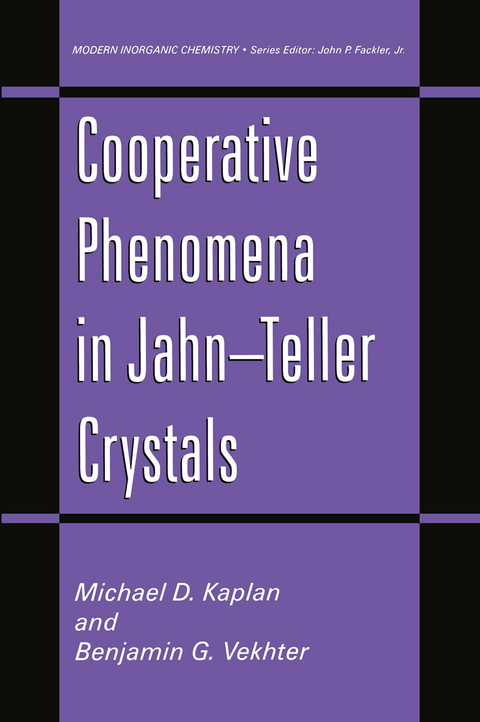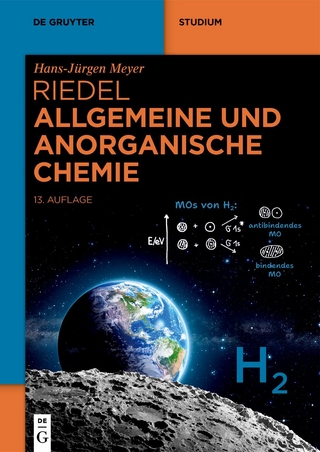
Cooperative Phenomena in Jahn—Teller Crystals
Kluwer Academic / Plenum Publishers (Verlag)
978-0-306-44928-4 (ISBN)
1. The Jahn—Teller Effect.- 1.1. The Jahn—Teller Theorem.- 1.2. Electron-Vibration Coupling in the Case of Electronic Degeneracy.- 1.3. Typical Jahn—Teller Situations.- 1.4. Interaction with Rotations and Quadratic Vibronic Coupling.- 1.5. Situations Similar to the Jahn—Teller Effect.- 1.6. Manifestation of the Jahn—Teller Effect.- 1.7. Examples of Jahn—Teller Systems.- References.- 2. Interaction of Jahn—Teller Centers.- 2.1. Direct Exchange in Orbital Degeneracy.- 2.2. Superexchange in Orbital Degeneracy.- 2.3. Indirect Exchange through Conduction Electrons.- 2.4. Multipole Interactions.- 2.5. Interaction of Ions through the Exchange of Virtual Phonons.- 2.6. The Cooperative Jahn—Teller Effect.- 2.7. Types of Jahn—Teller Orderings.- References.- 3. The Elastic Properties of Crystals with Jahn—Teller Structural Phase Transitions.- 3.1. Tetragonal ? Orthorhombic Phase Transitions with Twofold-Degenerate States.- 3.2. Cubic ? Tetragonal Structural Phase Transitions in Crystals with a Threefold-Degenerate Ionic Ground State.- 3.3. Structural Phase Transitions Induced by the Cooperative Pseudo Jahn—Teller Effect.- 3.4. Characteristics of Structural Phase Transitions in Singlet-Doublet-Singlet Systems.- 3.5. The Cooperative Jahn—Teller Effect in Dynamic Electron-Phonon Coupling.- 3.6. Anomalies of “Nonsoft” Elastic Constants in Jahn—Teller Structural Phase Transitions.- References.- 4. Mutual Influence of Distortive, Magnetic, and Electric Dipole Orderings in Jahn—Teller Elastics.- 4.1. Mutual Quenching of Structural and Magnetic Orderings.- 4.2. Mutual Enhancement of Structural and Magnetic Orderings.- 4.3. Magnetic Anisotropy and Noncollinearity of Magnetic Structures.- 4.4. High Spin-Low Spin Phase Transitions.- 4.5. Domain Walls inthe Competition of Structural and Magnetic Orderings.- 4.6. Interrelationship between Acoustical and Dielectric Anomalies in Ferrodistortive Antiferroelectrics.- 4.7. Antiferrodistortive Ferroelectric Transitions.- 4.8. Interrelationship between Distortive and Electric Dipole Structures in Noncentrosymmetric Crystals.- 4.9. Anomalies of the “Transverse” Dielectric Susceptibilities.- 4.10. Coexistence of Spontaneous Strains of Different Symmetries in Mixed Crystals.- References.- 5. Jahn—Teller Crystals in External Fields: Phase Diagrams and Properties.- 5.1. Phenomenological Description of Striction in Jahn—Teller Crystals.- 5.2. Dynamic Magnetostriction of Systems with Mutual Suppression of Magnetic and Distortive Interactions.- 5.3. Dynamic Magnetostriction of Systems with Mutual Enhancement of Magnetic and Distortive Interactions.- 5.4. Anomalous Electrostriction and Magnetoelectric Effects.- 5.5. Metamagnetoelasticity of Antiferroelastics.- 5.6. Structural Transitions Stimulated by a Magnetic Field.- 5.7. Magnetodistortive Phase in Jahn—Teller Antiferromagnetics and Its Properties.- 5.8. Anomalous Magnetic Nonlinearity of Elastics.- 5.9. Electric Field-Induced Ferroelastic-Antiferroelastic Phase Transition.- 5.10. Reorientational Structural Phase Transitions in Jahn—Teller Crystals.- References.- 6. The Dynamics of Jahn—Teller Crystals.- 6.1. Electron-Phonon Modes and Sound Absorption.- 6.2. Frequency Dependence of the Response Functions.- 6.3. Mixed Electron-Phonon Modes in Crystals with Several Jahn—Teller Ions in the Unit Cell.- 6.4. Hyperfine Interaction and Nuclear Sound Absorption.- 6.5. Parametric Sound Generation.- 6.6. The Central-Peak Problem.- 6.7. Transport Phenomena in Jahn—Teller Crystals; Thermal Conductivity.- References.
| Erscheint lt. Verlag | 30.6.1995 |
|---|---|
| Reihe/Serie | Modern Inorganic Chemistry |
| Zusatzinfo | XV, 427 p. |
| Verlagsort | Dordrecht |
| Sprache | englisch |
| Maße | 152 x 229 mm |
| Themenwelt | Naturwissenschaften ► Chemie ► Anorganische Chemie |
| Naturwissenschaften ► Geowissenschaften ► Mineralogie / Paläontologie | |
| ISBN-10 | 0-306-44928-5 / 0306449285 |
| ISBN-13 | 978-0-306-44928-4 / 9780306449284 |
| Zustand | Neuware |
| Informationen gemäß Produktsicherheitsverordnung (GPSR) | |
| Haben Sie eine Frage zum Produkt? |
aus dem Bereich


